弥尔顿失乐园中撒旦的形象分析
失乐园中最生动的形象

失乐园中最生动的形象
《失乐园》是英国文学作家约翰·弥尔顿创作的一部史诗诗歌,描述了亚当和夏娃在伊甸园中受到撒旦引诱堕落的故事。
其中最生动的形象可能是撒旦,他是一个被描绘为反叛和狡猾、具有人形和蛇形特征的人物。
在《失乐园》中,撒旦是一个具有复杂性和魅力的角色。
他拥有超凡的能力和完美的美貌,是天使长和跟随他的叛逆天使的领袖。
但撒旦的骄傲和自我中心导致了他和上帝的矛盾,最终导致他被赶出了天堂,成为被放逐的堕落天使之一。
随着剧情的发展,撒旦依靠巧妙的言辞和欺骗慢慢地影响了亚当和夏娃的思想,导致他们背离了上帝的教导,最终被驱出伊甸园。
撒旦在小说中角色的转化和复杂性,以及他引诱夏娃堕落的过程,使读者对他的印象深刻,成为小说中最具生动形象的角色之一。
撒旦意象赏析――读弥尔顿《失乐园》-最新文档资料

撒旦意象赏析——读弥尔顿《失乐园》言:弥尔顿《失乐园》约翰?弥尔顿(John Milt on , 1608—1674),作为十六世纪文艺复兴和十八世纪启蒙运动的过渡性人物,是十七世纪英国最著名的诗人,思想家,政论家,更是一位勇敢的革命实践者。
《失乐园》借用《圣经》中《旧约?创世纪》第二、三章的内容,描述上帝创造了人类,把他们安置在伊甸园中,同时告诫人类,园中一棵能够分辨善恶的智慧树果实不可以摘食。
魔王撒旦得知这一消息时,出于对上帝的报复,化作蛇形成功诱骗人类,人类最终被逐出乐园。
三百多年来,撒旦形象一直是人们争论的焦点。
传统观念中的撒旦通常是《圣经》里那个不折不扣的魔鬼形象。
直到17世纪,伟大诗人弥尔顿《失乐园》的诞生,撒旦的历史彻底改变了,他被描绘成了一位有血有肉、理性与感性混杂的多元艺术形象。
有高度赞扬撒旦的,如雪莱在《诗辩》中说道:“《失乐园》中所表达的撒旦这一角色是旺盛精力和性格魅力无与伦比。
”[1];也有坚持撒旦就是魔鬼的,如牛津学者刘易斯( C.S Lewis )《APreface to Paradise Lost 》:“从英雄到将领,从将领到政客,从政客到特务,接着潜入卧室或浴室的窗户,再变成一只蟾蜍,最后成为一条蛇,这就是撒旦的全过程”。
所以正确分析撒旦,对于理解和欣赏《失乐园》这部伟大的史诗有着重大作用。
1.迷惑形象:崇高形象的英雄A.崇高形象一一坚毅刚强史诗开篇就将我们置于一个振奋人心的崇高背景之下:我们损失了什么?并非什么都丢光不饶的意志、热切的复仇心、不灭的憎恨以及永不屈服、永不退让的勇气还有什么比这些更难战胜的呢?”(I105 -109 )这是魔王撒旦为了争取自由,挑战上帝权威而与伙伴们在天界大战,战败后跌落广漠的烈火深渊,清醒过来说的一番话。
这是一场可怕的战争,同样,这也是一个可怕的深渊,给人以无尽的绝望和凄凉。
但这一切并没有让撒旦失去信念,反而激起了他更大的斗志,撒旦做出了下面这个决定:与其在天堂里做奴隶,倒不如在地狱里称王”(I264 -265 )B.英雄领袖一一充满人性这么一个刚毅、充满勇气和希望的魔王无疑是崇高的,但也是这么一个英雄形象又有着我们凡人有血有肉的一面:他在看到同伴们即他的追随者们由于他而被剥夺了幸福和光荣后,在准备发言时,竟“三次要开口,三次泣不成声”(I621)之后,他们在“万魔殿”里召开了严肃的会议,讨论是否为了恢复天国,冒险再发动一场战争。
弥尔顿笔下的撒旦形象
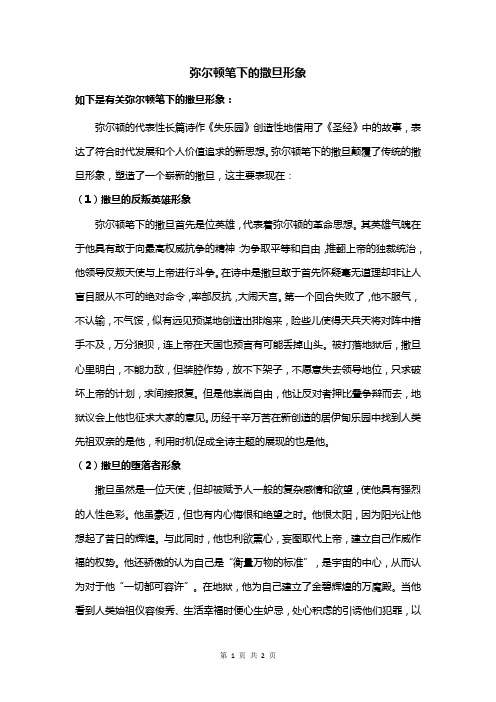
弥尔顿笔下的撒旦形象如下是有关弥尔顿笔下的撒旦形象:弥尔顿的代表性长篇诗作《失乐园》创造性地借用了《圣经》中的故事,表达了符合时代发展和个人价值追求的新思想。
弥尔顿笔下的撒旦颠覆了传统的撒旦形象,塑造了一个崭新的撒旦,这主要表现在:(1)撒旦的反叛英雄形象弥尔顿笔下的撒旦首先是位英雄,代表着弥尔顿的革命思想。
其英雄气魄在于他具有敢于向最高权威抗争的精神:为争取平等和自由,推翻上帝的独裁统治,他领导反叛天使与上帝进行斗争。
在诗中是撒旦敢于首先怀疑毫无道理却非让人盲目服从不可的绝对命令,率部反抗,大闹天宫。
第一个回合失败了,他不服气,不认输,不气馁,似有远见预谋地创造出排炮来,险些儿使得天兵天将对阵中措手不及,万分狼狈,连上帝在天国也预言有可能丢掉山头。
被打落地狱后,撒旦心里明白,不能力敌,但装腔作势,放不下架子,不愿意失去领导地位,只求破坏上帝的计划,求间接报复。
但是他崇尚自由,他让反对者押比叠争辩而去,地狱议会上他也征求大家的意见。
历经千辛万苦在新创造的居伊甸乐园中找到人类先祖双亲的是他,利用时机促成全诗主题的展现的也是他。
(2)撒旦的堕落者形象撒旦虽然是一位天使,但却被赋予人一般的复杂感情和欲望,使他具有强烈的人性色彩。
他虽豪迈,但也有内心悔恨和绝望之时。
他恨太阳,因为阳光让他想起了昔日的辉煌。
与此同时,他也利欲熏心,妄图取代上帝,建立自己作威作福的权势。
他还骄傲的认为自己是“衡量万物的标准”,是宇宙的中心,从而认为对于他“一切都可容许”。
在地狱,他为自己建立了金碧辉煌的万魔殿。
当他看到人类始祖仪容俊秀、生活幸福时便心生妒忌,处心积虑的引诱他们犯罪,以此来报复上帝,毁掉他所创造的福境——人类始祖居住的伊甸园,使人类受到上帝的惩罚,从而达到自己不可告人的目的。
撒旦在极端个人主义的驱使下,一步步走向堕落,以致到了暴虐和放荡的地步。
尤其是当他引诱人类始祖的计谋得逞时,便向新世界传播“罪恶”和“死亡”,违抗“自然法规”,致人于死地。
简述失乐园中撒旦的形象外国文学

简述失乐园中撒旦的形象外国文学有人认为,撒旦是人类失去乐园的祸根,最终受到上帝的惩罚。
但作为一个魔鬼,撒旦不是一个击即溃、头脑简单的傻瓜,否则耶稣所受的考验就称不上奇迹了。
对付人类,撒旦一计不成又升一计,所以人类上了他的当。
在天堂,他也同样不甘寂寞,首次谋反被打入地狱仍不甘心,甚至更加疯狂地鼓动再次造反,向“独揽大权,肆虐天庭”的上帝“进行一场永不调和的战争”。
的确,撒旦的演说慷慨激昂,非常精彩,制造出一派不战不休的气势。
如果我们把它与其创作时的历史背景联系起来,上帝才是一个专制、施暴者的化身。
因此作者从撒旦的形象上隐藏着作者对革命势力的悲哀,以及对暴君者们的嘲笑和讽刺。
在诗歌中,塑造了撒旦这一叛逆者的革命形象,作者以撒旦为资产阶级革命的代言人,颂扬了反叛专制暴政的资产阶级革命思想,而最终撒旦在对上帝的对抗中失败,从而失去天堂的乐园,寓意着资产阶级革命的失败和封建势力的复辟。
作者在感情上对撒旦的失败和受到的惩罚表达了同情之心,因为撒旦的失败和受到的惩罚,很像资本主义受封建权威的压迫。
但是由于诗人是一个虔诚的教徒,在理智上并不允许他对撒旦持肯定态度,这就造就了撒旦矛盾形象的另一面,也就是撒旦本性里恶的一面的表现。
撒旦的英雄形象主要表现在前两部,那是叛逆者的英雄气概。
诗人的宗教信仰决定了撒旦最后的命运,凡是违抗上帝旨意者,最终都会受到惩罚的。
人类也是如此,亚当和夏娃受到撒旦的诱惑,违背了上帝的旨意,最终被赶出了伊甸园,但是人类的被驱逐和撒旦的被驱逐也是有区别的。
亚当和夏娃在走出伊甸园时,他们对于自己的行为怀着深深的忏悔之心,圣子给予了他们启示,天使为他们指点未来,只要他们诚心忏悔,最终是会得到上帝的原谅的,他们是满怀着希望地走向了另一个世界。
而撒旦的结局却是迥然不同的,那是他罪有应得的,这是因为撒旦选择了孤注一掷的卑劣的报复,并且没有为他的报复行为产生悔恨之意。
在成功地诱惑了人类,使无辜的人类受到上帝的惩罚时,撒旦欢呼自己的胜利,但是此时他却发现,他以及他的徒众都变成了令人厌恶的蛇,也使我们最终认清了撒旦的真实面目,他依旧是一个邪恶的魔鬼,这也是撒旦在《失乐园》中最后的形象。
失乐园中撒旦形象

试析《失乐园》中撒旦的形象车家玲(安阳师范学院人文管理学院,河南安阳 455000)摘要:撒旦是《失乐园》中颇具有争议性的人物,他既是一位为了平等和自由敢于向最高权威进行不屈不饶抗争的反叛英雄,又是一个权欲熏心、骄矜狂妄的堕落者同时他还是祢尔顿关于自由意志与理性原则并存的思想观念的艺术载体,即人为了自由和理想而奋斗,但同时人的行为得受到真理的约束。
关键字:撒旦;双重人格;自由与理性一、引言约翰·弥尔顿(1608-1674)是十七世纪英国著名的诗人、思想家、政治家和政论家。
他出身于伦敦一个公证人家庭,青少年时代起思想进步,厌恶封建思想,痛恨教会腐败。
革命爆发后他积极投身革命,参加了革命政府的工作,并撰写政论,先后发表了《论出版自由》、《论国王和官吏的权力》等文章而轰动整个欧洲。
王朝复辟后他虽然遭监禁,著作被焚烧,但仍然坚持革命立场,在双目失明,经济拮据的情况下完成了三大史诗《失乐园》、《复乐园》、《力士参孙》。
1674年诗人与世长辞。
弥尔顿的长篇史诗《失乐园》( Paradise Lost, 1667)深邃、高贵、整饬、优美,一直被誉为“英语中最伟大的诗作”,是英国文学史上不可多得的鸿篇巨制,在世界文学史上可与《神曲》和《浮士德》相媲美。
弥尔顿的长篇史诗《失乐园》,以《圣经·旧约·创世记》第二、三章关于人类始祖亚当、夏娃在撒旦引诱下偷食禁果犯下原罪,被上帝逐出伊甸园的故事为蓝本,成功地将诗人—作为一个清教徒,所相信的人类重返上帝的乐园的回归之路极为完整、生动地展现在读者面前。
这条路发端于人类始祖的原罪,转折于耶稣基督道成肉身的救赎,作结于自由意志选择下的灵魂的忏悔和回归。
诗人满怀豪情的诗意书写,所展现的是诗人的人生理想、人生信念。
就全诗而论,从太初谈起,开天辟地,创造世界,创造人类;借《圣经》故事,虽涉及全人类原罪赎罪的悲剧,但实质上说的是人类求知求生,追求自由人权,反对盲目迷信,反对封建专制,建立人类社会理想的大同世界。
浅谈撒旦在失乐园中的形象 毕业论文

摘要约翰·弥尔顿,是英语文化历史上最有名的作者之一。
他的杰作——《失乐园》,无疑是整个英语文化历史上的一座里程碑。
他创造了一个特别的形象,并且使人们能够以另一种不同的角度来看待传说中的恶魔——撒旦。
他的作品使撒旦更加形象生动,更加人性化,并且使其在某些角度上看起来是一名英雄,或是枭雄。
弥尔顿选用了一长段的篇幅来描写撒旦对他的追随者所说的一场雄辩,这段独白中也蕴含了米尔顿自己的意志和精神。
他的字句反映出了他毕生所挚爱的自由,同时还暗示了通过暴力方式进行的革命终究会失败。
这就是为什么本作中的撒旦会具有这样一种矛盾性。
他热爱自由,却不能通过暴力手段得到他想到的。
同时,撒旦在整本书中还扮演了一个失败者。
尽管弥尔顿用了一些积极的语句和情节来形容撒旦,但是该角色的邪恶本质从未有所改变。
关键词:英雄、自由、撒旦、失败目录1 简介 (1)2失乐园中的撒旦 (1)2.1撒旦作为一个自主的形象 (3)2.2英雄撒旦 (3)2.3撒旦的矛盾 (4)3圣经和本书中撒旦形象的不同 (4)3.1撒旦是圣经中一切邪恶的集合 (4)3.2撒旦是《失乐园》中的英雄 (4)3.3两个不同形象间的区别 (5)3.3.1人们认为失乐园中撒旦是英雄的原因分析 (5)3.3.2撒旦在失乐园中的形象更具人性化 (5)4该书与当时社会背景的联系 (5)4.1不同形象暗示不同阶级 (5)4.2蕴含了弥尔顿的意志 (6)4.2.1自由是整本书的主旨 (6)4.2.2撒旦的结局注定是失败的 (6)5总结 (7)参考 (8)浅谈撒旦在《失乐园》中的形象1 简介当莎士比亚还在写着他的著作的时候,英国的另一个伟大的诗人在伦敦诞生了。
他是约翰·弥尔顿。
弥尔顿的父亲是一个清教徒,他酷爱音乐,因此,在他的影响下,小弥尔顿也热爱音乐,当然,还有书。
伟大的史诗——《失乐园》,这本描述撒旦怎样背叛上帝以及亚当和夏娃如何被赶出伊甸园的故事的巨作,花费了弥尔顿7年的时间。
撒旦人物性格

弥尔顿在《失乐园》中把人类之母巅这一基督教史诗人物描绘成了一个极富人性的形象。
研究弥尔顿的学者们普遍认为,诗人笔下的夏娃反映出他不但同意,并且还成功地采用了宗教上历来将人类之母人格化的传统。
然而,在夏娃身上,弥尔顿除了令人信服地塑造了人类之母,他还写出了作为女人和妻子的夏娃的复杂特性,使她成为一个有着分裂且自相矛盾的性格特点的人物。
研究弥尔顿的学者们在评论《失乐园》时曾指出夏娃的双重身份即是伊甸园的女王,又是丈夫的仆从。
这种双重身份导致了她那庄严而又恭顺、神圣而又脆弱的对立心态和个性。
正如汉密尔顿所指出的,夏娃钠形象通常依赖于许多显然是很微小的细节。
他视夏娃为“捉摸不定、躁动不安的造物”,是个矛盾的、潜在不安定的因素,因此又称她为“人类的破坏者和保护者,蛊惑的荡妇和纯洁献母亲”。
谈到夏娃在故事中的双重角色,汉密尔顿是这样写的危险和弱点所在,是分散并引诱他的坏影响,使他执迷、远离了真理。
①夏娃是造就男人所必需的因紊,缺了她,男人就不成其为男人·旦她又是男人的在她完善亚当,使他幸福的同时,她也给亚当带来了毁灭的可能而一旦通过她使亚当毁灭以后,她又必然地成了亚当赎罪的一种手段。
··德迈特卡普鲁斯则着重探讨夏娃作为女人的原始模式的特点,称她为“决定命运的女人”。
他认为弥尔顿笔下的夏娃身上既显现出恭顺谦虚又包苦着妖妇的特点,她“富有邪恶的魅力和隐秘神奇的强烈情欲”。
他指出,在弥尔顿笔下,我们人类的母亲也许是第一次被完整地、但肯定是被最壮观地用文学体现为一个命中注定要引导人类犯错误的女人②。
然而在夏娃的个性中最重要、也是最普遍地表现出来的冲突就是,她有着既依赖亚当又寻求自我独立的双重欲望。
在她与亚当关系的最初阶段,夏娃处于完全依赖的地位,她自己也在许多场合直言不讳地承认过这种依赖性。
但早在他刚从亚当的身体分离出来的时候,她的行为和言谈就已经显示出她作为一个女人,在坚持不懈地寻找自我。
《失乐园》中撒旦的艺术形象分析
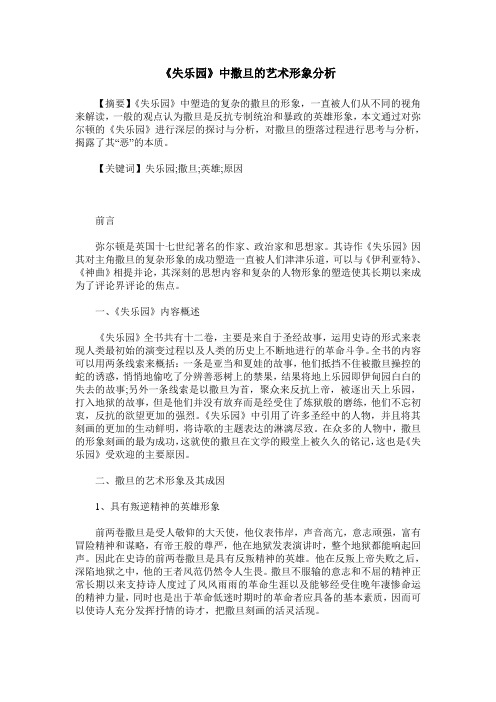
《失乐园》中撒旦的艺术形象分析【摘要】《失乐园》中塑造的复杂的撒旦的形象,一直被人们从不同的视角来解读,一般的观点认为撒旦是反抗专制统治和暴政的英雄形象,本文通过对弥尔顿的《失乐园》进行深层的探讨与分析,对撒旦的堕落过程进行思考与分析,揭露了其“恶”的本质。
【关键词】失乐园;撒旦;英雄;原因前言弥尔顿是英国十七世纪著名的作家、政治家和思想家。
其诗作《失乐园》因其对主角撒旦的复杂形象的成功塑造一直被人们津津乐道,可以与《伊利亚特》、《神曲》相提并论,其深刻的思想内容和复杂的人物形象的塑造使其长期以来成为了评论界评论的焦点。
一、《失乐园》内容概述《失乐园》全书共有十二卷,主要是来自于圣经故事,运用史诗的形式来表现人类最初始的演变过程以及人类的历史上不断地进行的革命斗争。
全书的内容可以用两条线索来概括:一条是亚当和夏娃的故事,他们抵挡不住被撒旦操控的蛇的诱惑,悄悄地偷吃了分辨善恶树上的禁果,结果将地上乐园即伊甸园白白的失去的故事;另外一条线索是以撒旦为首,聚众来反抗上帝,被逐出天上乐园,打入地狱的故事,但是他们并没有放弃而是经受住了炼狱般的磨练,他们不忘初衷,反抗的欲望更加的强烈。
《失乐园》中引用了许多圣经中的人物,并且将其刻画的更加的生动鲜明,将诗歌的主题表达的淋漓尽致。
在众多的人物中,撒旦的形象刻画的最为成功,这就使的撒旦在文学的殿堂上被久久的铭记,这也是《失乐园》受欢迎的主要原因。
二、撒旦的艺术形象及其成因1、具有叛逆精神的英雄形象前两卷撒旦是受人敬仰的大天使,他仪表伟岸,声音高亢,意志顽强,富有冒险精神和谋略,有帝王般的尊严,他在地狱发表演讲时,整个地狱都能响起回声。
因此在史诗的前两卷撒旦是具有反叛精神的英雄。
他在反叛上帝失败之后,深陷地狱之中,他的王者风范仍然令人生畏。
撒旦不服输的意志和不屈的精神正常长期以来支持诗人度过了风风雨雨的革命生涯以及能够经受住晚年凄惨命运的精神力量,同时也是出于革命低迷时期时的革命者应具备的基本素质,因而可以使诗人充分发挥抒情的诗才,把撒旦刻画的活灵活现。
解析《失乐园》中撒旦人性特征
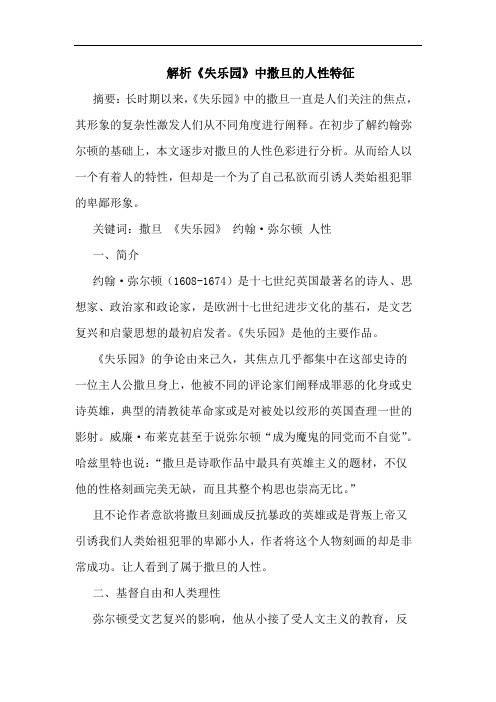
解析《失乐园》中撒旦的人性特征摘要:长时期以来,《失乐园》中的撒旦一直是人们关注的焦点,其形象的复杂性激发人们从不同角度进行阐释。
在初步了解约翰弥尔顿的基础上,本文逐步对撒旦的人性色彩进行分析。
从而给人以一个有着人的特性,但却是一个为了自己私欲而引诱人类始祖犯罪的卑鄙形象。
关键词:撒旦《失乐园》约翰·弥尔顿人性一、简介约翰·弥尔顿(1608-1674)是十七世纪英国最著名的诗人、思想家、政治家和政论家,是欧洲十七世纪进步文化的基石,是文艺复兴和启蒙思想的最初启发者。
《失乐园》是他的主要作品。
《失乐园》的争论由来己久,其焦点几乎都集中在这部史诗的一位主人公撒旦身上,他被不同的评论家们阐释成罪恶的化身或史诗英雄,典型的清教徒革命家或是对被处以绞形的英国查理一世的影射。
威廉·布莱克甚至于说弥尔顿“成为魔鬼的同党而不自觉”。
哈兹里特也说:“撒旦是诗歌作品中最具有英雄主义的题材,不仅他的性格刻画完美无缺,而且其整个构思也崇高无比。
”且不论作者意欲将撒旦刻画成反抗暴政的英雄或是背叛上帝又引诱我们人类始祖犯罪的卑鄙小人,作者将这个人物刻画的却是非常成功。
让人看到了属于撒旦的人性。
二、基督自由和人类理性弥尔顿受文艺复兴的影响,他从小接了受人文主义的教育,反对封建礼教。
捍卫民主,肯定人的价值,推崇自由。
基督教人文主义是在对柏拉图主义和中世纪的基督教新教义的综合下形成的。
以人为衡量一切事物的标准,注重人对于真和善的追求,启发人们认识自身的价值,以人性反对神权,用个性解放反对禁欲主义,用理性反对蒙昧。
弥尔顿的《失乐园》中表现出了基督教人文主义:基督自由和人类理性。
诗中的撒旦毫无疑问是一个悲剧的角色,但也不失为一个另类英雄,他宣称自己是自由的捍卫者,反抗上帝的绝对权力,他认为上帝是:“独揽大权,在天上掌握虐政呢。
”于是同自己的生存环境中做斗争,敢于反抗。
当撒旦为了其自由从高高在上的天使坠落成地狱的恶魔,在反抗上帝时,他说:“你们必也自知都是天上的子民,本来不从属于谁,即使不完全平等,却都自由,平等的自由,因为地位和等级,跟自由不相予盾,可以和谐地共存。
《失乐园》中撒旦形象的双重性分析_英语毕业设计论文
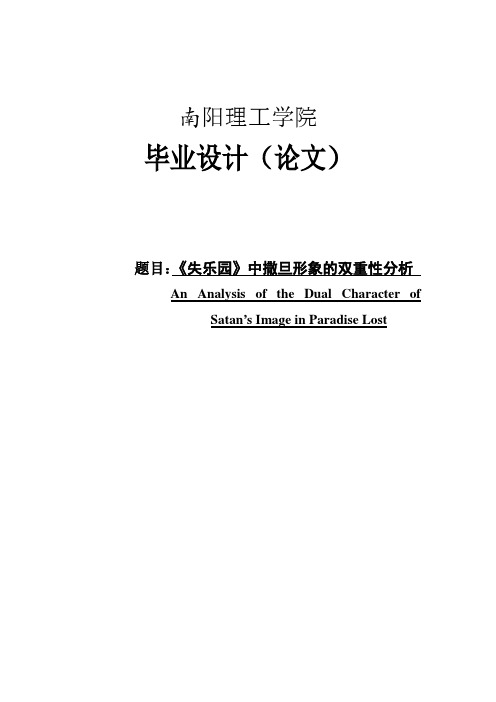
南阳理工学院毕业设计(论文)题目:《失乐园》中撒旦形象的双重性分析An Analysis of the Dual Character ofSatan’s Image in Paradise Lost《失乐园》中撒旦形象的双重性分析[摘要]在约翰.弥尔顿所有的著作中,《失乐园》是最复杂,最难理解的一部作品,并为他赢得了永久的荣誉。
在《失乐园》中,撒旦的形象是最生动,逼真的,他的巨大影响力和矛盾的情感,以及其复杂性,掩盖了其他所有的形象包括上帝。
作为《失乐园》中最重要的形象,撒旦显然是令人钦佩的,而且有着巨大的影响,这种矛盾的情感吸引了众多批评家的目光,引起了几个世纪的争论。
这篇论文将要把撒旦的双重形象分成三种类型进行分析:第一种类型是把撒旦作为革命者的形象;第二类是把撒旦作为魔鬼的形象进行分析;第三类是以评论家的观点,保持中立,认为撒旦的形象,除了是由人们构想的,是抽象的以外,撒旦带给我们更多的是好与坏的混合体。
而且本论文还将要查明影响撒旦双重性格形象的因素,从分析正文看作者的写作意图;从十七世纪的社会背景看弥尔顿个人的经历和信仰。
更多的是那些潜在的读者的背景和他们独特的欣赏力,也被作者考虑在内。
所有的这些分析得出的观点是,撒旦是一个仅有的英雄和一个真正的恶魔,从他所有的看法和情感得到一个多方面的性格。
他的矛盾情感鲜明的遍及整个诗篇。
[关键词] 《失乐园》撒旦革命者魔鬼清教徒An Analysis of the Dual Character of Satan’s Image inParadise Lost[Abstract]All of John Milton’s great works. Paradise Lose is the most complicated and most profound one, which wins him endless honor. The image of Satan in Paradise Lost is supreme vivid, powerful, ambivalent and complex, overshadowing all the other characters including God.As the main character of Paradise Lost, Satan is obviously impressive and powerful, whose ambivalence catches all critics’ eyes and leads to centuries’ disputes. This dissertation will analyze the dual character of Satan’s image into three groups: The first group that the image of Satan as a revolutionist, the second group that the image of Satan as a devil, while the third group of critics, stand in the middle, seeing both sides of Satan. They identify Satan either as an abstract conception or else, more immediately, as someone who is an evil mixed with good. On the other hand, check the factors that influence his dual character of image, from the analysis of the text to the author’s intention, from the 17th century social background to Milton’s personal experiences and belief. What’s more, the potential readers’ background and individual taste will also be taken into consideration. And all these analysis lead to the point that it is too simple and arbitrary to say Satan is a mere hero or a pure devil, since he is a round character full of thoughts and emotions. His ambivalence is obviously throughout the whole poem.[Key Words]Paradise Lose Satan revolutionist devil puritanContentsIntroductionChapter 1 The Bual Character of Satan’s Image1.1 The Image of Satan as a Revolutionist1.1.1 Sadan owns the spirit of hero as a revolutionist1.1.2 Sadan’s wisdom and emotion1.2 The Image of Satan as a Devil1.2.1 Sadan is vicious and furious1.2.2 Sadan’s other wrong deedsChapter 2 Historical Factors Contributing to the Dual Character of Satan’s Image2.1 The Influence of the puritan movement2.2 The Influence of the restorationChapter 3Potential Readers’Influence on the Formation of the Dual Characterof Satan’s Image3.1 Puritans’ view of Satan3.2 Revolutionists’ idea of Satan3.3 Neutral modernists’ interpretation of SatanConclusionAcknowledgementReferencesAn Analysis of the Dual Character of Satan’s Image inParadise LostName:Li Yanyan Number:51406182 Class:065142IntroductionJohn Milton, one of the greatest poets of the English language, is a political commenter of the English Bourgeois Revolution, whose importance is acknowledged all over the world. His powerful, rhetoric prose and the eloquence of his poetry had an immense influence especially on the 18th century verse. He is the last rearguard of the Renaissance and the primary promoter of Enlightenment and he is the love of every form of human culture and the steadfast devotion to duty as the highest object in human life have shaped his entire career.Of all his great works, Paradise Lost is the most complicated and most profound one, which wins him endless honor. It is indeed the only generally recognized epic in English literature since Beowulf and a heroic poem in Renaissance style. It recounts the story of Satan's rebellion against God, and of the disobedience and fall of Adam and Eve. It deals with revolt from God, with sin and fall, and with the possible salvation. It presents the author’s views in an allegoric religious form, and readers will easily discern its basic idea—exposure of the ways of Satan and justification of the ways of God to men. It is a reflection of the reactionary forces of Milton’s time and the passionate appeal for freedom.As the main character of Paradise Lost, Satan is obviously impressive and powerful, whose ambivalence catches all critics’ eyes and leads to centuries’ disputes. Those critics can be classified into three groups. The first group mainly consists of revolutionists.They traditionally read this epic with strong political inclination,thinking Satan as the protagonist and considering him a symbol of revolution (Fowler 45). They are generally called pro-Satanists. They think Satan is infinitely superior to man, entirely different from the devil of the miracle plays, and completely overshadowing the hero both in interest and in manliness (Danielson 134). The second group is formed by the anti-Satanists. They follow the theme of sense and regard Satan’s hubris without sense as the cause of his own tragedy. They view Satan as an absolute devil, the root of our immense pain from generation to generation. Though his lingering traces of angelic nature and his assertion of implacable defiance at the beginning of the poem disguise him as a righteous liberator, it can’t change Satan’s evil nature (Huang Delin 52). He is doomed to destruction by the flaw of self-love and over-ambition. Both pro-Satanists and anti-Satanists have evidence to support their statements, but neither of them can prove their points of view with sufficient details. While the third group of critics, such as John Carey, stand in the middle, seeing both sides of Satan. They are apt to believe that Satan’s ambivalence is intended by Milton to achieve depth (Danielson 160). They identify Satan either as an abstract conception or else, more immediately, as someone who is an evil mixed with good.Based on the critics’points of view, this dissertation will analyze the dual character of Satan’s image and check the factors that influence his dual character of image, from the analysis of the text to the author’s intention, from the 17th century social background to Milton’s personal experiences and belief. What’s more, the potential readers’background and individual taste will also be taken into consideration. And all these analysis lead to the point that it is too simple and arbitrary to say Satan is a mere hero or a pure devil, since he is a round character full of thoughts and emotions. His ambivalence is obviously throughout the whole poem.Chapter 1 The dual character of Satan’s imageHistorically and traditionally, Satan is considered the symbol of evil, however, in John Milton’s epic—Paradise Lost, we can find a completely new image of him. Here he is no longer a simple-minded devil. He is a round character full of thoughts and emotions. Although in his spirit some evil genes still exist, he is gifted with more heroic characteristics. That is, Satan is a tragic villain hero driven by ambition.1.1 The image of Satan as a revolutionistRevolutionists are always courageous to fight against the uncoordinated factors of the society; they aren’t reconciled to being dictated to the mighty power. They make good use of their courage and wisdom to strike for the equality and freedom, which stand for a sound and positive society. They are confident that the victory belongs to them. In Paradise Lost, Satan demonstrates these personalities of a revolutionist in his strong desire for freedom, equality and his wisdom to fight against the tyranny of the God.1.1.1 Sadan owns the spirit of hero as a revolutionistSatan, originally called Lucifer,was one of the greatest angelic beings who serve God in Heaven. He is the most beautiful angels and God’s first-hand man, steadfast angel and the sublime grandeur of a graceful but tremendous spirit. Nevertheless, he is tired of flattering God and takes arms to fight for freedom. When being faced with God’s tyranny and mighty power, Satan doesn’t act as a coward. On the contrary, he appears even braver. He is not afraid of losing everything. Failure will only strengthen his will and his confidence.“All is not lost; the unconquerable will, /And study of revenge, immortal hate, /And courage never to submit or yield (Jin Fashen 10)” he declares, “Since through experience of this great event, /In arms not worse, in foresight much advanced, /We may with more successful hope resolve /To wage by force or guile eternal war /Irreconcilable to our grand Foe. (Jin Fashen 10)”There isundoubtedly something thrilling as he summons up his defeated powers, collects together the scatter legions of the lost angels, addresses them with words of defiance of God “Clashed on their sounding shields the din of war, /Hurling defiance towards the vault of heaven” (Zhang Boxiang 384). The sense of being lost, far from causing him to slump, propels him with furious energy. This is how fear and despair are turned into courage. Clearly, such a turning of hell to fortitude is admirable. It is no cheapening of the heroism to say that it consists in making energetic resistance out of despair. It is not that the heroism of Satan’s defiance is bogus. On the narrative level, we cannot but admire Satan’s courage in venturing into the unknown, which shows the transcendent glory by his superior courage and abilities.If we listen to Satan as he wishes to be heard, his speech asserts equality, freedom, and nobility of soul. He appears to demand a kind of heavenly democracy; hence, he sees that God disturbs freedom as the first step toward slavery. Compared with Satan, God’s feature seems much duller. He is the ruler of heaven but “holds the tyranny (Jin Fashen 12)”by saying “what I will is Fate (Jin Fashen 86)”. He has the mighty power but still doubts it while facing Satan’s defiance. He is the creator but prevents human beings from reaching the Tree of Knowledge. He is selfish. He wants to control all the creatures under fatuity and backwardness so that he could maintain his sole reign. He leaves the fallen angels to go on falling forever and has no mercy on his people. He hates everything that would challenge his power. Belial counsels acceptance of God’s will, but his acceptance is informed by fear and sloth, not by love. Their consciousness of worth and intolerance of servitude are seen when the fallen angels claim, “rather seek /Our own good from ourselves, and from our own /Live to ourselves, though in this vast recess, /Free, and to none accountable, preferring /Hard liberty before the easy yoke” (Jin Fashen 20).It is no exaggeration to say that everything in heaven has a hellish travesty. However, Satan is just the opposite there. He looks forward to equality, to freedom and to knowledge. He poses,“…Knowledge forbidden? /Suspicious, reasonless! /Why should their Lord Envy them that? /Can it be sin to know, can it be death? /And do they only stand /By ignorance? (Jin Fashen 52)” Thus, in some way, Satan has become a speaker of the human beings. What hedoes is to help people to gain wisdom and to find their true happiness. In this sense, Satan, under Milton’s description, is no longer the symbol of evil but stands for the justness, liberty and equality. He stands as republican and atheist in heaven, appealing to an aristocratic notion of established status and constitutional rights. It is the liberty for which Satan is contending and which the Father’s imposing of a new king threatens, not least by his implying that all dignities and titles are owed to the sovereign and so may be resumed or altered by him at will. From all these words, we can see the essence and virtue of a hero in Satan.1.1.2 Sadan’s wisdom and emotionAnother aspect worthy noting is Satan’s wisdom. A good example is his tempting Adam and Eve to eat fruit from the Tree of Knowledge against God’s instructions. Satan disguises himself in the shape of snake and approaches Eve (not Adam, who is more sensible) at the very time she works alone. He starts the conversation with praise for Eve’s beauty, which is woman’s favorite, then comes to the target topic, and makes the emotional Eve loss her last line of defense and cannot wait to eat the fruit and touch her bright future. Another evidence sparking is when the God announces, “Your head I him appoint; /And by myself have sworn to him shall bow /All knees in Heaven, and shall confess him Lord. (Jin Fashen 66)”, Satan’s brilliant feedback: “Who can in reason then or right assume /Monarchy over such as live by right /His equals, if in power and splendor less, /In freedom equal (Jin Fashen 68)? /our puissance is our own (Jin Fashen 70)”.This is not only a challenge to God, but also a summon for right and liberty, which is rather inspiring. What’s more, Satan is also emotional and human. For instance, when he sees Adam and Eve in love, he is moved first to admiration and love and then to pity. And at the sight of the suffering of his fellows, he bursts into “Tears such as angels weep (Danielson 168)”.Sympathy is aroused immediately by such kind of sensibility. Satan also has the determination to enjoy the happiness and share the tears together with his dear followers by promising, “Joined with me once, now misery hath joined (Jin Fashen 8)”. We do continue to admire him, not just for his bravura performance, but because we see ourselves in Satan. And rather than consider ourselves devils, we consider him human.1.2 The image of Satan as a devilAlthough Satan shows the positive character of his image, he still has some intrinsically evil genes. A leopard cannot change his spots. As the curtain rises, he is already literally and symbolically fallen: evil exists in opposition to good.“With ambitious aim”, he is “Against the throne and monarchy of God, /Raised impious war in /Heaven and battle proud with vain attempt. (Jin Fashen 4)”1.2.1 sadan is vicious and furiousPride, we are told, leads Lucifer to envy, envy to revolt, and revolt to expulsion from heaven. Looking into the following example, the motive for this slight of tongue is pride: “Our being ordain’d to govern, not to serve”, since if all are chiefs, who are the Indians (Miller 87)?If an ordination takes place, who, among equals, does the ordaining? It shows that Satan has violated the law by which he lives; his ensuing career is tragic study in the negative will bound in its own error. He tells us of feelings of pride and envy, which make Satan unable to bear the Son’s exaltation. Lifted up high, he wishes to take a higher step. However, trying to step higher from his bright eminence in heaven makes him lose his perch and the things he have had. “Lost of happiness and lasting pain torments him; /round he throws his baleful eyes, /that witnessed huge affliction and dismay mixed /with obdurate pride and steadfast hate. (Jin Fashen 6)” It is the case of self-suggested temptation and fall.The slogan of Satan’s rebellion is freedom and independence, but freedom and independence lie in obedience, not in self-assertive rebellion. We can no longer admire Satan, because he is a fool seeing his free will only in terms of self-assertion. In the unfallen world, the rule is that creation returns thanks to the creator, and this return is made freely by good will at once indebted and discharged, as Satan did before his rebellion. However, to bad will, debt becomes extortion, and the return of gratitude sticks in Satan’s throat, “in a moment quit / The debt immense of endless gratitude, /So burdensome still paying, /still to owe (Jin Fashen 42)”. In his loss, Satan speaks with a moral understanding of both the freedom of gratitude and the unfreedom of resentment. So Satan converts what is a source of gratitude and freedom into a source of resentment and constraint. In this circumstance, whatever we think ofheaven’s free love, through Satan’s eyes its goodness seems compelling; this attitude makes him more and more evil. So the study of Satan’s evil is the corruption of good. Satan has violated the conditions for true liberty. The rigid authoritarianism is Satan’s and freedom lies in faithful obedience to God. To be free is precisely the same thing as to be pious. Satan’s eagerness to justify his position as leader has ineptly undermined his stand as libertarian. Satan makes a false heroic idea. The idea of him destroys his innate goodness and makes his hero comes to seem childish.1.2.2sadan’s other wrong deedsHe is tragic, however, not just through the resonance of his anguish, but because he makes a choice that destroys him. As God is made up of all virtues, Satan is composed of contending fragments of evil. Those fragmented aspects of the devil are represented in medieval art by the seven deadly sins: wrath, pride, lust, envy, sloth, avarice, and gluttony. Correspondingly, in Paradise Lost, Belial symbolizes sloth; Mammon, avarice; Moloch, hated. The concluding episode of book2 compresses those many evils into three personalities: Satan, Sin, and Death. Respectively, they represent cause, act, and effect, and their chaotic family tree is an obvious perversion of God’s own begetting of the Son. Sin is Satan’s daughter-mistress and his act of disobedience, while Death is the outcome of their incest. The trinity—Satan, Sin, and Death—shown to the reader is the demonic one. Death sits within hell’s gate. When Satan first sees Sin and Death, he fails to recognize his daughter and to acknowledge his son. To Sin, he says he has never yet seen “Sight more detestable than him and thee” (Miller 97).Readers share his reaction as he recognizes the dim, primordial monsters as obscenities locked from the light of civilization. In recognizing Sin and Death, Satan admits to his own perverse deformity. When Satan leaps into chaos, he thinks that he has left Sin, Death, and hell behind. Only later does he realize that he himself is hell: Satan as cause contains both act (Sin) and result (Death) in his every fiber. Sin is the way to be damned, but also that a reprobate like Satan, who tries to avoid submission and punishment, can only do so through further sin, incurring further damnation and punishment, “for within him Hell /He brings, of worse deeds worse sufferings must ensue! (Jin Fashen 40)”and “Which way he fly is Hell (JinFashen 44)”. There is no room for sympathy since Satan has made the bed in which he lies.In short, Satan’s image is of dual character. By seeing from the textual level, Satan’s wickedness and heroism are crossed. On the one hand, he poses as a revolutionist fighting bravely for liberty and equality with his wisdom and emotion. On the other hand, he exposes his ambition and pride, holding a false idea of freedom and right, begetting Sin and Death, spreading evil and seducing human creatures. Satan is an archangelic being with perfect intelligence, but doomed to operate imperfectly.Chapter 2 Historical factors contributing to the dual characterof Satan’s imageA work cannot be interpreted correctly regardless of its related environment. Similarly, the vague image of Satan has its root in the turmoil of the time during which Paradise Lost was written. This part will check the factors that influence the image of Satan. It consists of examining the 17th century social background and the author’s experiences and belief for a better understanding of Satan’s image.2.1 The influence of the puritan movementThe Puritan movement, in its broadest sense, may be regarded as a second or greater Renaissance, a rebirth of the moral nature of man. The very Renaissance had been essentially pagan and sensuous, accompanied by a moral awakening especially in England, that greatest moral and political reform which ever swept over a nation in the short space of half a century. It had two chief objects: personal righteousness and civil and religious liberty, which is quite similar to the purposes of heavenly rebellion led by Satan.That was a transitional society, full of violence, revolution, tyranny and many unstable factors. People doubted about their future and their value. Some of them submitted and only lived for life’s sake, just like some angels yielding to God’s authority and flattering him to maintain their glories. But still many of them stood outand devoted all their life to the course of freedom and happiness, the same as Satan and his followers do. Milton was one of the revolutionists. He supports his motherland’s revolution against king’s tyranny for human liberty with his wisdom and sharpened pen. He works so hard against the European reactionaries in order to vindicate the action of beheading the king CharlesⅠthat he losses his sight, but even in such kind of condition, he still sticks to his struggle. He creates lots of great masterpieces to present the truth and reality with his imaginations, to encourage English people. This kind of perseverance can find its reflection in the image of Satan, since even when he has lost all the glories around him and been driven out of Heaven, he still holds on to his belief. According to the bigotry, bellicosity, obstinacy and radicalness reflected during the course of fighting for his personal pursuit, Satan is blind, but it is just in such defect where his lofty and self-respect lay (Ma Haijian). So was Milton. He is not only a pious puritan, but also a revolutionist eager to fight. He allows the revolutionary in himself to take root in Satan. The conflict between Satan and God is, in fact, the one that between the Parliaments which are on behalf of liberty---which Milton was advocating--- and the stubborn despotic royal force. The revolutionary spirit is quite obvious. Milton’s pursuance of freedom and equality is exactly that of Satan.At the beginning of the epic, Milton “assert Eternal Providence, /And justify the ways of God to man”(Jin Fashen 4), but the description of God and Heaven is totally different from the poet’s original intention. God is the symbol of authority while the angels are all obsequious without personality. Unsatisfied with God’s tyranny, Satan takes arms to challenge the authority and asserts civil right. That is quite in accordance with Milton’s attitude—people have their right either for the governor or against the governor, so long as they wish. Satan’s first challenge is to God. Though he know at the very beginning the margin between him and God, Satan is not afraid of performing the course he thought righteous. That makes his angelic image more glory and his deed more admirable. Even when Satan seduces our forefather, we do own thanks to him, for it is him who lets us become wit and experienced. The demanding of Adam “yet sinless, with desire to know /What nearer might concern him, how thisWorld /Of Heaven and Earth conspicuous first began (Jin Fashen 84)” makes us feel “wisdom at one entrance quite shut out. (Jin Fashen 30)” and doubt “is knowledge so despised? /Or envy, or what reserve forbids to taste? (Jin Fashen 58)” Satan’s great courage, rebellion spirit, perseverance and wisdom are highly praised here, which makes him the real central figure in this epic.But naturally, as a national movement, Puritan Movement had its extremes and excesses. And the intensity of the struggle against despotism made men narrow and hard. In the triumph of Puritanism under Cromwell, severe laws were passed, many simple pleasures were forbidden, and an austere standard of living was forced upon an unwilling people. Next, Cromwell conquered Ireland and Scottish, unifying the three counties. And the supreme authority was in his hands as his closest followers declared Parliament dismissed in December 1653. He thus assumed the title of Lord Protector. Another autarch had replaced the former one. The initial righteous rebellion turns to be an ambitious aggression. The Movement essentially failed, since no liberty and civil right are realized. Satan shares the same process with Cromwell. They are both preservers and destroyers. As he reins the Hell, Satan becomes more extreme and more destructive. The case is genuine heroism wrongly used in relation to himself and others. A leader of liberty is transformed to a ruler of despotism, and then is damned further.2.2 The influence of the restorationUnfortunately, in 1660, when CharlesⅡsuccessfully achieved the Restoration of the kingdom, all Milton’s labors and sacrifice for humanity were apparently wasted. He was immediately marked for persecution, and his books were burned by the public hangman. His daughter, upon whom he depended in his blindness, rebelled at the task of reading to him and recording his thoughts. All the policies that he had worked for so passionately had suddenly been abrogated. So he couldn’t help sighing with strong emotion: “If you beest he—but O how fallen! (Jin Fashen 8)” The Republic came to an end; the Restoration brought people another turbulence. The whole Britain suffered total reversal again. The failure urged Milton to soul-searching. And it was the time when God’s authority resumed, and Satan was transformed to a serpent.In literature, the Age was definitely the one of confusion. The spiritual gloom, which sooner or later fastened upon all the writers of the age, was due to the breaking up of accepted standards of government and religion. That led the literary men of the time to look backward for their golden age unconsciously. This could also be a clue to understand Satan, since Milton mixed reason in Puritanism with morality and constituted Puritan Humanism, and the thought was reflected in his Paradise Lost. As the last rearguard of the Renaissance and the primary promoter of Enlightenment, he endowed his introspection to humanism on his greatest image of Satan portrayed in this poem. Although Milton’s study of the will focused on the inner world of temptation, guilt and repentance, he treated these things not just as they borne on one’s relation to oneself or to God, but to others also. Satan’s fall corrupted others as well as himself, so no grace would be extended to him. Milton’s was a disciplined, rational, responsible moral freedom beyond the reach of most political activists. (Fowler 43)His individual emphasis is on the freedom of the disciplined life: obedience is freedom; independence is slavery. In heaven, political loyalty is religious loyalty, and Satan’s republicanism violates both. So Satan’s rebellion for freedom turns to be a path to slavery. Will is free, determined neither by divine predestination nor by subliminal psychodynamics. Satan has the free will to stand but he chooses to fall. And in Milton’s view, virtue is not cloistered innocence untroubled by passions, but rather the difficult experience of rationality, of perpetual rational choices between seductively deceptive alternatives (Fowler 37). So, no matter how just the excuses are, Satan does spread evils and bring torment to human beings. Satan’s formidable intellectual powers are engaged in what is self-deception before it turns to deception of others. The process of negation takes him from heroic denial of the order of heaven to a perverse and mean form of resistance, and ruses of concealment and self-deception re-enter in ignoble, self-corrupting forms. Here is a committed revolutionary, a supporter of regicide, who nevertheless makes his rebel angels devils.So far, Milton was lost into great ambivalence. On the one hand, instead of withdrawing from society, Milton remained social, no longer participating directly in politics, but continuing to host foreign visitors and work closely with friends andacquaintances as he produced some of his greatest writings. On the other hand, because of the force of the society, whatever he tried, he was doomed to receive more strikes and despair. He suspected of the meaning of his endeavor. So in this way we can realize why the feature of Satan is ambivalent. The author has infused his own spirits and passion into Satan’s character. Satan’s fights with God are just like Milton’s fights with the society. Satan becomes a prolocutor of the author. They both are eager for freedom and both can’t escape from the unavoidable failure. That’s the tragedy—a hero’s tragedy. To Milton, it is the reality that he hates. He has worked so hard and enthusiastically for the society. However, at the end, it was still full of hypocrisy, dishonesty and inequality. It is a great sarcasm against his efforts and his ideality. So he would miss the past glorious time and hesitate to divorce the society. That also caused the ambivalence of the author as well as that of Satan.Finally, since man is the product of the society, he is inevitably limited by it all the time. So in a society that is full of tyranny and blood-violent, the author’s good dreams are sure to be mercilessly murdered. While Satan is the embodiment of the author, he must incarnate human being’s character, which is confined to his environment. Then Satan’s evil thoughts and actions are somewhat in accordance with Milton’s psychological activities under that kind of circumstance. Neither Satan nor Milton should be damned for that, for it’s the time and ill society that caused the rebellion in man’s mind. Though Milton thought of himself as a Christian, his inner sympathies with rebellion, anger and revolution often color the poem. Milton is of the devil’s party without knowing it. Satan’s defiance of the Divine Will is indispensable to the continuance of his identity, a predicament that raises him to tragic status. All these aspects are the refraction of Milton, who is quite ambivalent both as a frustrated revolutionist and a puritan under such kind of circumstance.Chapter 3 Potential Readers’Influence on the Formation ofthe Dual Character of Satan’s Image When reading a literary work, people always read it from the study of。
《失乐园》中撒旦形象的复杂性论析

文学评论·外国文学《失乐园》中撒旦形象的复杂性论析董亚楠 郑州职业技学院摘 要:弥尔顿的作品《失乐园》完成在十七世纪的英国,那时的英国宗教信仰色彩非常浓厚,人们都信奉上帝是完美的、不容置疑的。
《失乐园》中撒旦的形象却是要与上帝斗争到底的一个神灵,在失败之后不反省自己,还继续与上帝抗争,最后把灾难带去人间。
但是对于撒旦形象的认识很多人的观点都不一致,有称赞其抗争精神的,也有反对其对抗上帝行为的,因此撒旦的形象是很复杂的,很难有统一的定论。
本文就《失乐园》中撒旦形象的复杂性进行论析。
关键词:《失乐园》;撒旦;形象;复杂作者简介:董亚楠(1987-),女,汉族,河南省郑州市荥阳人,郑州职业技术学院助教,研究方向:语言文学。
[中图分类号]:I106 [文献标识码]:A[文章编号]:1002-2139(2019)-23-088-02弥尔顿,英国的政治家和学者,著有史诗《失乐园》,和荷马的《荷马史诗》、但丁的《神曲》并列称为西方的三大诗歌。
弥尔顿生长在一个生活富足的家庭里,父母也都是清教徒。
这样的成长环境为弥尔顿的文学作品提供了很多灵感,让他对文学充满热爱,对宗教文学更是迷恋,他的文学作品里都包含着宗教的成分。
在他的史诗作品《失乐园》里面主要描述了撒旦先是聚集一部分天使来对抗上帝,失败后被逐出天堂。
随后又通过各种手段潜入伊甸园,通过诱骗,成功使得亚当与夏娃偷吃了伊甸园里知识树上面的禁果,导致亚当和夏娃被上帝责罚赶出伊甸园的故事。
还有撒旦与上帝强烈的对抗行为也是《失乐园》中的精彩部分,最后撒旦的结局就是和其同伙一起被变成了蛇,受到了应有的惩罚。
在作品里,撒旦的形象塑造是非常复杂与多面性的,我们要全面分析才能更好地来解读这一人物形象。
一、弥尔顿《失乐园》中的撒旦形象撒旦在《失乐园》里的形象不能从一个角度进行单一的定论,不同的人就有不同的理解角度,有人持肯定态度,有人持否定态度,也有人保持中立。
从肯定的角度来看,撒旦身上散发着一种贵族气概,有一定的领袖精神,带领着众人开启革命的道路,也许不一定会有收获,但是也能够笼络人心,有着很强的斗争反抗的精神,可以描述为一个英雄的形象。
弥尔顿的失乐园

弥尔顿的《失乐园》中撒旦形象分析约翰·弥尔顿是17世纪英国最著名的诗人、思想家、政治家和政论家,是欧洲17世纪进步文化的基石。
他从小受人文主义的教育,反对封建礼教,反对不彻底的英国宗教改革,同时他又鼓吹自由、平等、博爱,强调弑君无罪论,被称为启蒙思想的先驱者。
在新旧思想的搏斗中,在困苦艰难中写出诗作《失乐园》。
全部诗长达万行,分十二卷,是一部以圣经为题材的史诗。
通过《失乐园》一诗作者从作品思想内容出发,赋予这个古老的故事以新的内容。
艺术再现了英国资产阶级革命的进程。
同时弥尔顿通过对主宰宇宙的上帝、魔鬼撒旦和人类始祖亚当、夏娃等不同人物的塑造以及对他们的褒贬毁誉,体现了诗人创造史诗的深邃寓意。
值得我们从各个角度去研究、去讨论。
有关《失乐园》的长期争论几乎都集中在对于撒旦这一人物的看法上。
因此,对于撒旦这个人物的正确理解是如何欣赏弥尔顿这部史诗的关键。
现在我们就探索一下撒旦这个人物性格的不同侧面。
人们一直以来从不同的角度对撒旦的艺术形象进行阐释,认为撒旦是一个非常复杂的人物形象。
所以关于撒旦的形象研究在西方有“撒旦主义派”、“正统派”和“调和派”。
他们有的研究撒旦形象的革命性,有的研究撒旦形象的宗教性。
首先,撒旦是魔鬼的化身,教唆人类堕落的元凶。
因为在诗中撒旦是神的对立者,他嫉妒神子在天上的地位,要求凌驾于一切法律和权利之上,享受绝对自由,于是率同叛逆的天使反抗上帝,战败被打入地狱之后仍设计报复。
当他意识到自己不是上帝的对手后,转而偷入上帝创造的伊甸园百般引诱亚当、夏娃违背神的旨意,偷食禁果使其开始沉沦,把人类作为报复的工具。
阴谋得逞之后得意而去,留下灾难和痛苦让人类的先祖独自承受,他为了自私的目的毁灭了他人。
在弥尔顿看来谁侵犯了他人的自由,那个人便首先失去自由,变成一个奴隶。
撒旦正是这样的人,因此他将是自己罪恶的奴隶,必定要坠入罪恶的深渊。
从这个意义上说,撒旦的失败与堕落体现的不是上帝的万能,而是弥尔顿的思想。
论《失乐园》中撒旦的形象【优质】
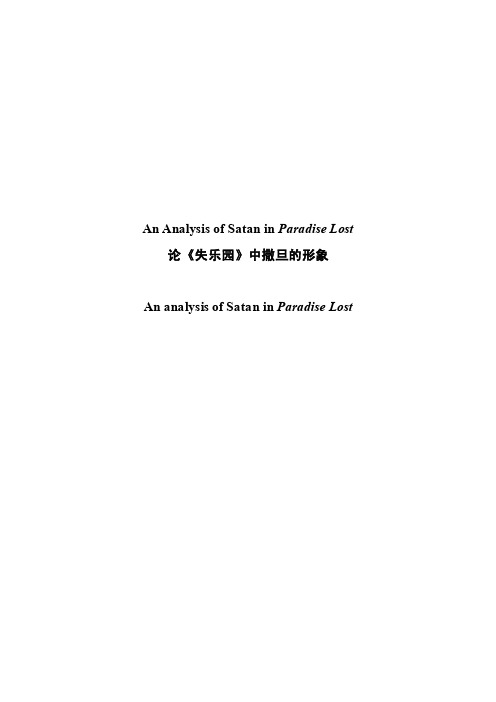
An Analysis of Satan in Paradise Lost 论《失乐园》中撒旦的形象An analysis of Satan in Paradise Lost摘要约翰·弥尔顿是英语文化历史上非常有名的一位作家。
他的著作—《失乐园》是英语文化史上的一座里程碑。
在约翰·弥尔顿所有的著作中,《失乐园》是最复杂,最难理解的一部作品,并为他赢得了永久的荣誉。
他的史诗使得撒旦的形象更加生动,更加具有人性,并且使其在某些方面成为了一名特殊的英雄。
弥尔顿用了很多的语句来描写撒旦对他的追随者所做的雄辩。
撒旦追求自由,但是却不能用暴力手段得到他想要的。
这就是撒旦在弥尔顿的著作中具有一种矛盾性。
尽管弥尔顿用了一种积极的态度来描写撒旦,但是撒旦邪恶的本性却从未改变。
他的矛盾情感鲜明地遍及整个诗篇。
这种矛盾的情感吸引了众多批评家的目光,引起了几个世纪的争论。
本文通过分析撒旦在《失乐园》中的形象,使得人们获得一种不同的视角来重新审视邪恶的撒旦。
他的字句反映了他毕生所挚爱的自由,同时暗示通过暴力方式所进行的革命终将会失败,这也体现了弥尔顿自己的意志与精神。
关键词:撒旦;自由;英雄;失败AbstractJohn Milton was a very famous writer during the history of English literature. His masterpiece Paradise Lost was undoubtedly a milestone in the history of English literature. Among all of John Milton’s great works,Paradise Lost was the most complicated and most profound one, which won him endless honor. His epic made Satan more vivid more humanized and made him a special hero in some aspects. Milton wrote a lot of sentences to describe Satan’s defense for his followers. Satan sought for freedom, but he couldn’t get what he wanted by violence. That’s why Satan in Milton’s masterpiece had a kind of contradiction. Although Milton adopted a positive attitude to describe Satan, his evil characteristic didn’t change at all. His ambivalence was obviously throughout the whole poem. This kind of ambivalence caught all critics’ eyes and led to centuries’ disputes.By analyzing Satan in Paradise Lost,the author of this paper aims to make people obtain a different angle to revisit the evil one, Satan. His words showed his lifelong love for freedom, and implied that the revolution would be failed by violence, which also reflected Milton’s own idea and spirit.Key Words:Satan; freedom; hero; failure安阳师范学院人文管理学院本科毕业论文Contents摘要 (I)Abstract (II)1. Introduction (1)2. The Realistic Significance of Paradise Lost (1)2.1 The Presentation of Every Image of Different Classes (1)2.2 The Theme of the Whole Book (2)2.3 The Doomed Ending of Satan (2)3. The Changes of Satan (3)3.1 Satan in the Bible (3)3.1.1 The Congregation of All the Sins in Bible (3)3.1.2 Satan’s Wisdom and Emotion (3)3.2 Satan in Paradise Lost (4)3.2.1 Satan as an Independent Image (6)3.2.2 Satan’s Contradiction (7)3.2.3 The Eloquent Satan (7)4. The Reasons of Satan’s Heroic Image (8)4.1 The Heroic Image of Satan (8)4.2 The More Humanized Satan (9)5. Conclusion (10)Bibliography (11)Acknowledgements (12)1. IntroductionWhile Shakespeare was still writing his great plays, another excellent English poet was born in London. He was John Milton. John Milton, one of the greatest poets of the English language, was a political commentator of the English Bourgeois Revolution, whose importance was acknowledged around the world. Although Milton’s father was a puritan, he was a music and book lover. Puritans refer to the people who assert themselves the most rigid believers of God. What’s more he taught little Milton to enjoy music and books. Milton has received humanistic thoughts from 16th century and accepted the great science achievements of the 17th century, at the same time he had a critical attitude towards his life. He thought that science was not everything. Without justice and science, people couldn’t get peace and real happiness. Milton’s literary ambition was to write an epic and he wanted his epic to be read by people in different countries. It took Milton seven years to finish the great epic Paradise Lost. Among all of John Milton’s great works, paradise Lost was the most complex and most impressive one, which won him everlasting honor. This book told the story of how Satan fought against God and how Adam and Eve were banished from the Eden. Satan was the major character in Paradise Lost. His images were impressive and powerful. The main character of this book was intricate and contradictory. After finishing his famous poem, John Milton wrote Paradise Regained and a play telling the story of Samson.2. The Realistic Significance of Paradise Lost2.1 The Presentation of Every Image of Different ClassesIn this epic, Milton gave detailed description of every image, and as we know, the epic reflected the society Milton lived, so each image had its own presentation.Milton was a puritan, who was very loyal to his beliefs. From this book, we can sense the strong will of freedom from Milton. Obviously, God was on behalf of the authority, and he was another best description of Milton’s personalities. Some peopleagreed with Satan and regarded God as a tyrant and egoist. While other people who condemned Satan, took God as a merciful, just and lenient authority. The author also told us something from Abdiel’s mouth that the compliance with God was not servility, but the only way of getting freedom. These people who defied their superiors and stirred up a new rebellion were not servile and inferior. And as to Adam and Eve, they were tempted by Satan and punished by God, like all the common people, all the civilian class, they didn’t have the power or courage to fight against the authority, so they chose to adapt themselves to it. Because of the prominent background, the story in Paradise Lost and the Bible had a lot in common. That’s a very important reason why Paradise Lost became so popular.2.2 The Theme of the Whole BookIf you have known Milton very well, you may find out that before he wrote this epic his life was not that positive. When he lived in this world, he loved freedom very much and tried his best to get freedom. Freedom as a topic is throughout the whole masterpiece.The book has something to do with Milton’s own life experience. He was a tough guy, who never gave up his own belief and would stick to his will forever. Milton didn’t agree with the old way of teaching, which reflected his disobedience to feudalistic force, just as Satan’s rebellion against God and the conflict from heaven. “We may with more successful hope resolve to wage by force or guide eternal war, irreconcilable to our grand foe, who now triumphs, and in the excess of joy. Sole reigning holds the tyranny of heaven.”(Milton, 1667:1608)Instead of withdrawing from society, Milton still played an active role in political affairs. Although he was not going to take part in politics directly, he continued to work with friends and colleagues closely. Satan’s rebellious and heroic images were presented in Milton’s thoughts. He always sought for freedom, like Satan always took some measures to get rid of God’s control.2.3 The Doomed Ending of SatanMilton was a loyal puritan and he knew that freedom was the only way to gethappiness. And revolution was a good way to get freedom. But at last, Milton realized that the revolution at that time couldn’t get real freedom. So, to some degree, the revolution must be a failure in his opinion. What’s more, from this book we can see that Satan was the typical representative of the revolutionary class, so we can say that failure was the doomed ending of Satan. By studying English history, we knew that the puritan revolution was a failure just like Milton implied in Paradise Lost. Violence is not a good way to solve problems. Milton was a puritan. Although he was not satisfied with the Crown, he didn’t agree to use the violence way to solve the conflict, either.Maybe this point of view was not that right in reader’s eyes, but in fact, we all know that war will never bring happiness.3. The Changes of Satan3.1 Satan in the Bible3.1.1 The Congregation of All the Sins in the BibleThere were two major reasons which made Satan a complete monster in Bible. The first reason was that he seduced good people into doing evil things. The second one was his betrayal of God. If we didn’t know something about Satan and his forces, we would not have a clear understanding of basic spiritual realities of the universe. The reason why Satan became the biggest enemy of God was that he was against the foundation of the earth. His main purpose was to get the worship that only belonged to the originator, God. To most people, Satan’s major work was to be against human beings. He would try his best to destroy the mankind. What’s more, he would do it for good and without specific reasons. Fear and pride were the major motivations in Satan’s kingdom. That’s why Bible directed people to regard Satan as a devil in this universe.3.1.2 Satan’s Wisdom and EmotionSatan’s wisdom as an important aspect was worthy to be mentioned. To temptAdam and Eve to eat apple from the tree of knowledge, which was forbidden by god, Satan disguised himself as a snake. He waited silently for a good time. Once Eve worked by herself and Adam wasn’t around her, Satan would come out and approach her. Satan knew what women prefer to hear, so he normally started the conversation with praise for Eve’s beauty. Then he could get what he wanted and made the emotional Eve lose her last line of protection and couldn’t wait to eat the fruit. What’s more, Satan was also emotional. For example, when he found out Adam and Eve were in love, he was moved by their pure feelings. And he would burst into tears at the sight of the suffering of his followers. After reading this epic, we could also sense that Satan had the dream to share happiness and tears together with his beloved followers.3.2 Satan in Paradise LostJohn Milton was a great poet, thinker and political commentator of Englandin the 17th century. His masterpiece Paradise Lost was a long epic with 12 books, written in blank verse. These stories were taken from the Old Testament, such as the making of the earth, the love stories between Adam and Eve, the fallen angelsin hell plotting against God, Satan’s temptation of Eve, and the leasing of Adam and Eve from Eden. Although Satan and his adherents were driven out of heaven into hell, Satan and his followers were not discouraged. The miserable punishment, instead of rubbing off their will, makes them much angrier. The purpose of this poem was to tell people to justify the manner of God towards people. This outstanding work was the product of Puritanism, which has shown Milton’s own will and beliefs of freedom. Satan in his masterpiece was not the same as the one in the Bible and other books.In Paradise Lost, Satan was an independent image which can be studied and be discussed from a different perspective. I think the unique image of Satan was the reflection of the writer, who loved freedom and at the same time, expressed a kind of contradiction, and also the representation of the society at that time. This kind of idea has appeared in lots of articles written by Chen Weihong and professor XiaoMinghan’s two articles. (1999&2011) They both think that:1. The Satan in Paradise Lost was full of heroism, because of his defiant personality and the pursuit of freedom.2. These characteristics made Satan an eclectic image, and made God a little bit pessimistic.Xiao’s two articles showed that the unique image didn’t come from the Bible, but came from Milton himself. The words and actions Satan did in the hell and the main reason of his betrayal were the distinctive characteristics which helped Milton to describe Satan into a personalized image. The most important point in Satan’s characteristic was his strong will. No matter what kind of situation he was in, he had never changed his nature.Another writer’s composition also expressed this kind of idea, which showed that the image of Satan in Paradise Lost was vivid and impressive. Satan’s betrayal, in other words, was the indomitable will to seek for freedom, and rejection of God’s slavery. And the contradiction was also shown by him. His image was the mixture of optimism and pessimism. We all thought that the most evil person in the Bible was Satan or we can say that Satan was the aggregate of all the sins. In the Bible, Satan’s name meant obstruction and separation. He was the public enemy number one of God and he was a pervert in God’s eyes. Something like this has mentioned in Paradise Lost. According to this epic, we knew that Satan wasn’t born with sins. His sins and his resentment were coming from his free choice.Adam and Eve’s betrayal was the result of the wish for knowledge. After the punishment, they realized how to distinguish right from wrong, and started to beg the forgiveness of God. It was after the baptism of evil that the good would be more valuable. The last part was about Milton’s own idea, which has combined with Satan. Every image he had created was a reflection of different classes in the society of that time. In the paper of Huang Delin (2004), he has pointed out that Satan was Milton’s own presentation, and also, in Chen Jinxi’s article (2008), he said that the epic was thereflection of the People’s spiritual condition. Milton combined his epic with thepuritan revolution. God presented the Cromwell government or the dictatorship of England; Satan presented the force of revolution. It was Milton, who was a loyal puritan and had realized that freedom must be the basis to get the freedom, but the revolution couldn’t get the real freedom. From Milton’s point of view, the revolution must be a failure. That’s why Satan had a kind of contradiction, he loved and sought for freedom, but he couldn’t get what he wanted by the means of violence. These opinions have appeared at the beginning of a translation version which was translated by Jin Fashen.Lots of researches have been conducted on the images of Satan in Paradise Lost. It has left a profound and impressive influence on literature history. The author of this thesis will do a lot of stuff to do an analysis on this famous epic.3.2.1 Satan as an Independent ImageIn this masterpiece, the image of Satan was the most controversial image. The disputation about the image of Satan in Paradise Lost related to the inner nature of Satan was whether he was the hero in the epic or not. During all the literature history, tons of people thought Satan in Paradise Lost was a different image. In the first two volumes of Paradise Lost, some of Satan’s words showed he was a hero from time to time. John Milton’s Paradise Lost had a vivid description of a defiant Satan. He was banished from heaven and driven into the hell. Later, the image of Satan in Paradise Lost had been popular among people. The reason Satan could be an independent image in the epic, mostly due to his courage to show his indomitable will. After reading this masterpiece, we felt that Satan was like a hero in the earlier part of the epic. We could sense that through majesty in Satan’s appearance and fearless in his personality. However, with the story developed Satan’s image changed greatly. The most impressive nature of Satan was his contradiction. This element made the image of Satan glitter from the whole book, and became an actual part which is worth being studied.3.2.2 Satan’s ContradictionThere was a very interesting point in the whole personality of Satan, which washis contradiction, combined with wickedness and the strong will of freedom. Although Satan showed the positive character of his image, he still had some intrinsically evil genes. A leopard cannot change his spots. In this epic, although Milton was in favor of some traits of Satan, he had never tried to change Satan from a monster into a real hero: a monster is a monster.To readers, after reading the first several books of Paradise Lost, they could sense that the writer tried to describe Satan into a sympathy and friendly charac ter. On the content of this epic, besides the analysis of God’s and Satan’s personalities, there were also two points from the content of this book, which may reflect the aspects of disagreement in reader’s opinion. In the first two books of Paradise Lost, although Satan has made a good impression of hero on readers, he was still a monster as the initial story had told us. Adam and Eve made a mistake under the seduction Satan, and they suffered a lot from their mistake. The reason made Satan become such a kind of evil angle was his indomitable courage of chasing freedom.3.2.3 The Eloquent SatanIn Paradise Lost, Satan was written as a hero who insisted on his own belief and he had the courage to seek for his beloved freedom. These pro-Satanists admired Satan’s high superior nature and regarded him as the actual hero of this masterpiece.At the beginning of Paradise Lost, Satan made a wonderful speech which attracted many readers for a very long time. “That glory never shall his wrath or might. Extort from me. To bow and sue for grace with supplicant knee, and deify his power who, from the terror of his arm. Doubled his empire: that were low indeed. That was an ignominy and shame beneath. This downfall, since, by fate, the strength of God. And this substance cannot fail.”(Milton, 1667:1608)These words were powerful and clear which made Satan’s ambition became so apparent, and also reflected his fighting spirit and independent personality.Puritanism and the English Revolution were the distinguishing features of the seventeenth century. Milton realized it and he cleverly put political ideas to his pieces of art and also the images he created. Milton’s own life experiences and his pursuit of freedom caused him to endow Satan more or less with revolutionary spirit. Milton’s passion and feelings for revolution were reflected in the description of Satan and his rebellion.4. The Reasons of Satan’s Heroic ImageThe reason why people thought Satan in Paradise Lost as sort of a hero was due to his fearless. What’s more, he dared to fight against God. He always stuck to his own will, just like Milton himself. John Milton was born in a puritan family. What’s more, his childhood and the society that time gave him energy and resistance in his character, which was also easy to find from the words of Satan: “Princes, potentates, the flower of heaven, once yours, now lost. If such astonishment as this can seize eternal spirits! Awake, arise, or be forever fallen.”Though failed, Satan never gave up his unconquerable will. Here, Satan was more than just a leader in military accepting the rebel angles from angelic state, but also a smart politician using the powerful language of resistance as his weapon to fight against God.4.1 The Heroic Image of SatanPeople normally thought Satan in Paradise Lost has given a heroic impression to them. But it was a little bit of misunderstanding because of the words that Satan said in the following epic. “In The Odyssey, Homer lets Odysseus give a speech that would convince anyone they could survive the journey to the strait of Messina. Then we die with our eyes open, if we are going to die, or know what death we baffle if we can.” (Paradise Lost: 1243-1245)“Odysseus again lifts their spirits with this speech, Garcia 2 friends, have we ever been in danger before this? More fearsome, is it now, than when the Cyclops penned us in his cave? What power he had! Did I not keep my nerve, and use my witsto find a way out for us? We must now obey orders as I give them.”( Milton, 1667:1294-1302 ) Here Odysseus expressed the real capability of a hero to lead in the face of adversity.Satan as any other leaders would do, quickly reduced his partners’fear with much more powerful speeches. During the speeches, Satan talked his doubts about God’s supremacy and daringly stated they were better off where they were. “Here at least we shall be free. Here we may reign secure. Better to reign in Hell, than serve in Heaven.’’ (Milton, 1667: 258-263)These were the most powerful nature points of Satan in the whole masterpiece. What’s more he always insisted on his personalities, such as tough bosom, independent spirit, intelligence, and the power of his own. These four points all took effectiveness on Satan, which made Satan look like a hero.4.2 The More Humanized SatanIn Bible, and from most people’s points of view, Satan was the aggregate of all the sins, but in Paradise lost, Satan became a vivid image. What he said or did touched the readers profoundly. Milton wrote Paradise Lost to show people the source of misfortune. He thought the reason why Adam and Eve made a huge mistake and lost their beautiful home was that they were not strong enough to withstand the temptation of strangers. At the end of the story, we could know that, since Adam and Eve were lured into breaking the rules of Eden by Satan and they were all published by God and were driven out of Eden, Satan began to think about what he had done to the people, and he felt so sorry about what he had done. He blamed himself for a very long time. This kind of description made Satan look not that bad, but more humanized than the Bible said.From what we have read or learned in Paradise Lost, Satan may be a devil. But he had ambitious and dreams, even sometimes he was a hero. He was a person with strong will and he delivered some powerful speeches to his followers from time to time. Undoubtedly, the image of Satan in Paradise Lost was more vivid than ever before. To sum up, the image of Satan was of dual personality. By learning from thismasterpiece, Satan’s evil behaviors and heroism were crossed. On the one hand, he tried his best to fight bravely for freedom and liberty with his wisdom and passion. On the other hand, he had a wrong opinion of freedom and power even though he expressed his ambition and satisfaction.5. ConclusionThe words in Milton’s Paradise Lost reflected the Bible not only as a source of literature in western countries, but also influenced Milton greatly. we can learn something through the words of Milton. As a matter of fact, the Bible was often used to back up points of view on controversial things by poets. Since the Bible was studied by most of the people. And they used it as an authoritative source. Milton quoted a lot of things from the Bible and put them into his pamphlets.Through the history, John Milton’s Paradise Lost, particularly his description of the image of Satan has been studied by lots of people and understood in many different ways. Until now, it has been developed into all kinds of new interpretations. On the one hand, some people say that Satan was the true hero of the epic and Milton was on the monster’s side secretly. On the other hand, there are those who said Satan was a monster and Milton showed deep sympathy for God and the angels. There are also some people who interweave the two interpretations.But from the analysis of the above chapters, the changes of Satan’s character were obvious to see. And these changes make us get a much more different and much clearer picture of Milton’s own attitudes toward Satan. Milton spent all his life putting his political purpose into action.From my point of view, although Satan was a heroic image, he was not a hero. The spirit he expressed through the everlasting fighting against God made him a real fighter. And the love for freedom was the main theme which I have learned from this book. It is more than just a passage or a kind of study, but in the end, a sympathetic chord appeared during the reading. To sum up, the image of Satan in Paradise Lost was vivid, ambivalent and complex, overshadowing all the other characters.Bibliography[1] Grant, N. History of literature. Shanghai: Shanghai Foreign Language Press, 2004.[2] John, Milton. Paradise Lost. England: Penguin Classics Press, 1667.[3]陈敬玺.论失乐园对西方史诗传统的继承与发展[J].世界文学评论,2008,21(5):58-60.[4]陈薇红.失乐园中撒旦性格的探析[J].北京科技大学学报,1997,5(4):18-23.[5]黄德林.失乐园中撒旦形象的重新审视[J].上海大学外国语学院学报,2004,6(9):33-35.[6]李颖.雄辩与双重撒旦[M].云南:云南师范大学出版社,2006:31-34.[7]刘雯.失乐园中的撒旦形象对圣经原型的变异[J].文学评析,2008,3(12):22-23.[8]陶丹玉.失乐园中的撒旦形象浅析[J].高等函授学报,1997,6(2):52-55.[9]王朝杰.浅析失乐园中撒旦的英雄气概[J].外国文学研究,1999,11(9):13-15.[10] 肖明翰.失乐园中的自由意志与人的堕落与再生[J].外国文学评论1999,5(1):13-15.[11] 朱维之.失乐园译本[M].上海:上海译文出版社,1984:57-59.AcknowledgementsI would like to express my gratitude to all those who helped me during the writing of this thesis. I gratefully acknowledge the help of my supervisor, XXX, who has offered me valuable suggestions in the academic studies. In the preparation of the thesis, she has spent much time reading through each draft and provided me with inspiring advice. Without her patient instruction, insightful criticism and expert guidance, the completion of this thesis would not have been possible.I also owe a special debt of gratitude to all the teachers in Foreign Languages Institute, from whose devoted teaching and enlightening lectures I have benefited a lot and academically prepared for the thesis.I would finally like to express my gratitude to my beloved parents who have always been helping me out of difficulties and supporting me without a word of complaint.以下是附加文档,不需要的朋友下载后删除,谢谢班主任工作总结专题8篇第一篇:班主任工作总结小学班主任特别是一年级的班主任,是一个复合性角色。
《失乐园》中撒旦形象分析

2021-06文艺生活LITERATURE LIFE世界文艺《失乐园》中撒旦形象分析王宁(河南师范大学,河南新乡453007)摘要:作为一部宏伟史诗,弥尔顿的《失乐园》主要是对恶魔撒旦堕落史的讲述,其所描写的就是堕天使带领反叛天使来对抗上帝,希望能够获取自由。
这一部史诗所表现的是激进革命者与清教徒之间的一种冲突,其本身也是表达了对于独裁统治的厌恶,对于自由平等的一种渴望,以此来产生无限启迪与思考,其本身的研究价值非常可观。
本文主要就《失乐园》中的撒旦形象进行分析,希望能进一步加深对《失乐园》的理解和认识。
关键词:《失乐园》;撒旦;形象中图分类号:I561.072文献标识码:A文章编号:1005-5312(2021)18-0052-02DOI:10.12228/j.issn.1005-5312.2021.18.026一、前言阅读弥尔顿《失乐园》时发现撒旦这一人物形象仿佛与之前人们对于撒旦形象的认知有一定差异,主要是因为对于撒旦的感情存在一定的变化。
所以,本文重点分析撒旦的形象,从英雄与恶魔两个层面阐述,对弥尔顿笔下的撒旦形成更清晰的认识。
二、《失乐园》和撒旦不管是在学术界还是在读者心目中,弥尔顿的《失乐园》的地位是其他作品无法超越的,无论是刻画人物方面,还是对于情节的具体安排,都是让后人难以企及的。
整部作品之中对于上帝、撒旦、亚当夏娃等人物的塑造,让人们对此产生了浓郁的兴趣。
在这几个人物之中,对撒旦的争议是最大的。
撒旦的文学形象主要包含了两个方面:一个是评价的悲剧英雄,另一个是评价的恶魔形象①。
《失乐园》最后的结局是亚当夏娃失去了伊甸园,很多人都认为这属于一个喜剧结局,主要是因为虽然他们失去了伊甸园,但是心中却已经发到了自己希望的伊甸园。
如果基于撒旦的角度来进行分析,那么可以将其看成悲剧,原本一个单纯的、善良的天使,因为各种因素的影响,最终变成了恶魔,导致最后被上帝直接贬为一条蛇。
作为一个悲剧人物,撒旦的经历与结局是让读者同情的,这也使得撒旦形象具有悲剧英雄的色彩。
浅谈《失乐园》中撒旦形象
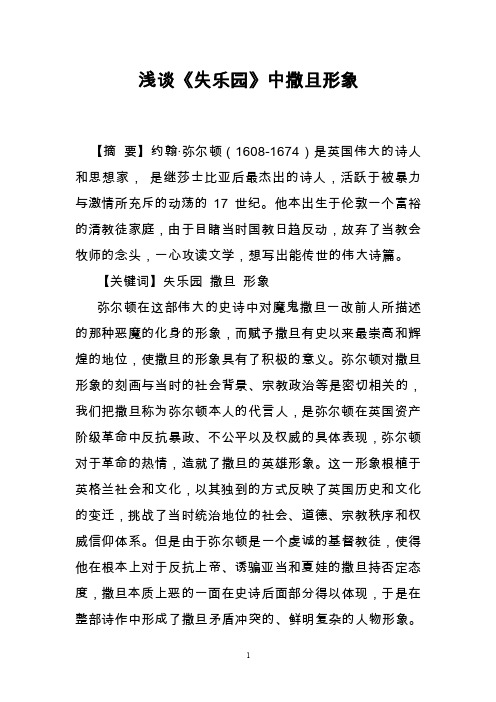
浅谈《失乐园》中撒旦形象【摘要】约翰·弥尔顿(1608-1674)是英国伟大的诗人和思想家,是继莎士比亚后最杰出的诗人,活跃于被暴力与激情所充斥的动荡的17世纪。
他本出生于伦敦一个富裕的清教徒家庭,由于目睹当时国教日趋反动,放弃了当教会牧师的念头,一心攻读文学,想写出能传世的伟大诗篇。
【关键词】失乐园撒旦形象弥尔顿在这部伟大的史诗中对魔鬼撒旦一改前人所描述的那种恶魔的化身的形象,而赋予撒旦有史以来最崇高和辉煌的地位,使撒旦的形象具有了积极的意义。
弥尔顿对撒旦形象的刻画与当时的社会背景、宗教政治等是密切相关的,我们把撒旦称为弥尔顿本人的代言人,是弥尔顿在英国资产阶级革命中反抗暴政、不公平以及权威的具体表现,弥尔顿对于革命的热情,造就了撒旦的英雄形象。
这一形象根植于英格兰社会和文化,以其独到的方式反映了英国历史和文化的变迁,挑战了当时统治地位的社会、道德、宗教秩序和权威信仰体系。
但是由于弥尔顿是一个虔诚的基督教徒,使得他在根本上对于反抗上帝、诱骗亚当和夏娃的撒旦持否定态度,撒旦本质上恶的一面在史诗后面部分得以体现,于是在整部诗作中形成了撒旦矛盾冲突的、鲜明复杂的人物形象。
说起基督,我们可以发现这样一句话:“别人打你的左脸,你把右脸也伸给他”。
以此断定,宗教意味着忍受无条件的屈辱。
但他们却不曾留意《马太福音》第二十一章及《路加福音》第十九章都记载过这样一个“沾净圣殿”的故事:耶稣进了神殿,看见人们在那里做生意,兑换银币,非常愤怒。
于是推倒他们的桌子、凳子,驱赶他们出殿。
并对他们说:“我的殿比称为祈祷的殿,你们倒使它成为贼窝啦。
”看来,耶稣并不是对任何事情都能无限容忍和顺从的。
更何况,《旧约》中的上帝更是一个威力无比、嫉恶如仇的形象,其程度常常到了极其残酷的程度。
自基督教被确立为西方权威宗教后,它就统治着西方的意识形态和道德体系。
撒旦式的人物正是挑战基督这样的“权利意志”的支配,超越所谓的“奴隶道德”,旨在保护基督统治下弱者的道德违反和权力意志,打击让欧洲人堕落的根源。
弥尔顿《失乐园》中撒旦形象的复杂性研究
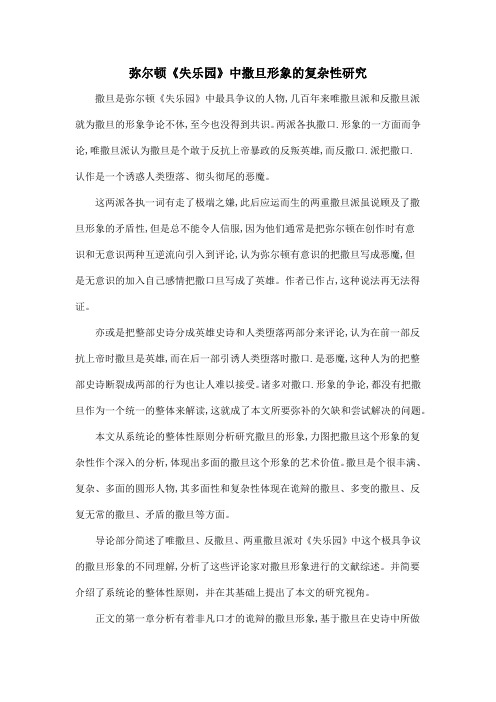
弥尔顿《失乐园》中撒旦形象的复杂性研究撒旦是弥尔顿《失乐园》中最具争议的人物,几百年来唯撒旦派和反撒旦派就为撒旦的形象争论不休,至今也没得到共识。
两派各执撒口.形象的一方面而争论,唯撒旦派认为撒旦是个敢于反抗上帝暴政的反叛英雄,而反撒口.派把撒口.认作是一个诱惑人类堕落、彻头彻尾的恶魔。
这两派各执一词有走了极端之嫌,此后应运而生的两重撒旦派虽说顾及了撒旦形象的矛盾性,但是总不能令人信服,因为他们通常是把弥尔顿在创作时有意识和无意识两种互逆流向引入到评论,认为弥尔顿有意识的把撒旦写成恶魔,但是无意识的加入自己感情把撒口旦写成了英雄。
作者已作占,这种说法再无法得证。
亦或是把整部史诗分成英雄史诗和人类堕落两部分来评论,认为在前一部反抗上帝时撒旦是英雄,而在后一部引诱人类堕落时撒口.是恶魔,这种人为的把整部史诗断裂成两部的行为也让人难以接受。
诸多对撒口.形象的争论,都没有把撒旦作为一个统一的整体来解读,这就成了本文所要弥补的欠缺和尝试解决的问题。
本文从系统论的整体性原则分析研究撒旦的形象,力图把撒旦这个形象的复杂性作个深入的分析,体现出多面的撒旦这个形象的艺术价值。
撒旦是个很丰满、复杂、多面的圆形人物,其多面性和复杂性体现在诡辩的撒旦、多变的撒旦、反复无常的撒旦、矛盾的撒旦等方面。
导论部分简述了唯撒旦、反撒旦、两重撒旦派对《失乐园》中这个极具争议的撒旦形象的不同理解,分析了这些评论家对撒旦形象进行的文献综述。
并简要介绍了系统论的整体性原则,并在其基础上提出了本文的研究视角。
正文的第一章分析有着非凡口才的诡辩的撒旦形象,基于撒旦在史诗中所做的儿次讲话。
撒旦是个语言大师,既能讲豪言壮语鼓舞士气的语言,也擅长甜言蜜语诱惑人类堕落的谎言。
在追随他的天使们面前,撒旦的豪言壮语能够鼓舞他们振作精神重新起来战斗,不乏英雄气;而在诱惑夏娃吃禁果时,撒旦所讲的甜言蜜语充满了欺骗,全显的是奸诈狡猾骗子的嘴脸。
这截然不同的诡辩的语言使得撒旦这个形象极显复杂性。
《失乐园》中的撒旦形象。
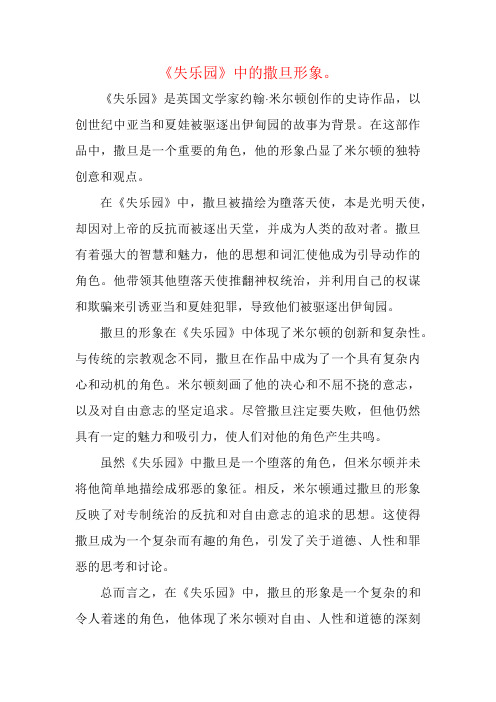
《失乐园》中的撒旦形象。
《失乐园》是英国文学家约翰·米尔顿创作的史诗作品,以创世纪中亚当和夏娃被驱逐出伊甸园的故事为背景。
在这部作品中,撒旦是一个重要的角色,他的形象凸显了米尔顿的独特创意和观点。
在《失乐园》中,撒旦被描绘为墮落天使,本是光明天使,却因对上帝的反抗而被逐出天堂,并成为人类的敌对者。
撒旦有着强大的智慧和魅力,他的思想和词汇使他成为引导动作的角色。
他带领其他堕落天使推翻神权统治,并利用自己的权谋和欺骗来引诱亚当和夏娃犯罪,导致他们被驱逐出伊甸园。
撒旦的形象在《失乐园》中体现了米尔顿的创新和复杂性。
与传统的宗教观念不同,撒旦在作品中成为了一个具有复杂内心和动机的角色。
米尔顿刻画了他的决心和不屈不挠的意志,以及对自由意志的坚定追求。
尽管撒旦注定要失败,但他仍然具有一定的魅力和吸引力,使人们对他的角色产生共鸣。
虽然《失乐园》中撒旦是一个堕落的角色,但米尔顿并未将他简单地描绘成邪恶的象征。
相反,米尔顿通过撒旦的形象反映了对专制统治的反抗和对自由意志的追求的思想。
这使得撒旦成为一个复杂而有趣的角色,引发了关于道德、人性和罪恶的思考和讨论。
总而言之,在《失乐园》中,撒旦的形象是一个复杂的和令人着迷的角色,他体现了米尔顿对自由、人性和道德的深刻
思考。
他的角色不仅仅是一个纯粹的反派,而是一个具有矛盾和内心动机的角色,使读者在思想和情感上都产生共鸣。
【撒旦形象下的艺术:谈《失乐园》】 失乐园撒旦形象分析
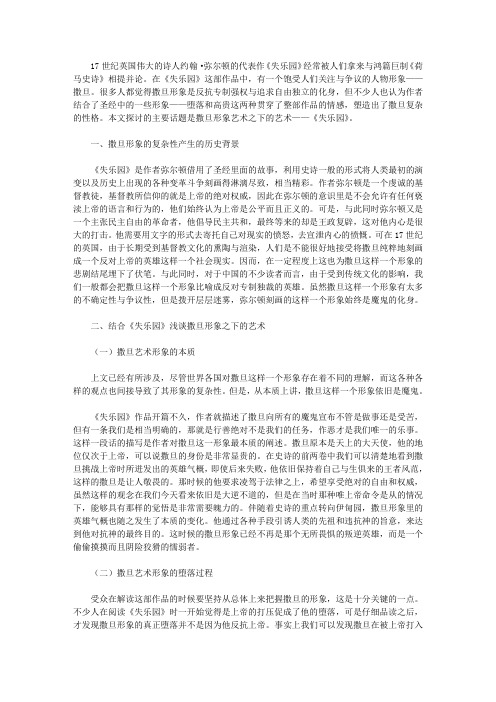
17世纪英国伟大的诗人约翰·弥尔顿的代表作《失乐园》经常被人们拿来与鸿篇巨制《荷马史诗》相提并论。
在《失乐园》这部作品中,有一个饱受人们关注与争议的人物形象——撒旦。
很多人都觉得撒旦形象是反抗专制强权与追求自由独立的化身,但不少人也认为作者结合了圣经中的一些形象——堕落和高贵这两种贯穿了整部作品的情感,塑造出了撒旦复杂的性格。
本文探讨的主要话题是撒旦形象艺术之下的艺术——《失乐园》。
一、撒旦形象的复杂性产生的历史背景《失乐园》是作者弥尔顿借用了圣经里面的故事,利用史诗一般的形式将人类最初的演变以及历史上出现的各种变革斗争刻画得淋漓尽致,相当精彩。
作者弥尔顿是一个虔诚的基督教徒,基督教所信仰的就是上帝的绝对权威,因此在弥尔顿的意识里是不会允许有任何亵渎上帝的语言和行为的,他们始终认为上帝是公平而且正义的。
可是,与此同时弥尔顿又是一个主张民主自由的革命者,他倡导民主共和,最终等来的却是王政复辟,这对他内心是很大的打击。
他需要用文字的形式去寄托自己对现实的愤怒,去宣泄内心的愤慨。
可在17世纪的英国,由于长期受到基督教文化的熏陶与渲染,人们是不能很好地接受将撒旦纯粹地刻画成一个反对上帝的英雄这样一个社会现实。
因而,在一定程度上这也为撒旦这样一个形象的悲剧结尾埋下了伏笔。
与此同时,对于中国的不少读者而言,由于受到传统文化的影响,我们一般都会把撒旦这样一个形象比喻成反对专制独裁的英雄。
虽然撒旦这样一个形象有太多的不确定性与争议性,但是拨开层层迷雾,弥尔顿刻画的这样一个形象始终是魔鬼的化身。
二、结合《失乐园》浅谈撒旦形象之下的艺术(一)撒旦艺术形象的本质上文已经有所涉及,尽管世界各国对撒旦这样一个形象存在着不同的理解,而这各种各样的观点也间接导致了其形象的复杂性。
但是,从本质上讲,撒旦这样一个形象依旧是魔鬼。
《失乐园》作品开篇不久,作者就描述了撒旦向所有的魔鬼宣布不管是做事还是受苦,但有一条我们是相当明确的,那就是行善绝对不是我们的任务,作恶才是我们唯一的乐事。
- 1、下载文档前请自行甄别文档内容的完整性,平台不提供额外的编辑、内容补充、找答案等附加服务。
- 2、"仅部分预览"的文档,不可在线预览部分如存在完整性等问题,可反馈申请退款(可完整预览的文档不适用该条件!)。
- 3、如文档侵犯您的权益,请联系客服反馈,我们会尽快为您处理(人工客服工作时间:9:00-18:30)。
Th’ inferal serpent; he it was whose guile, Stirred up with envy and revenge, deceived The mother of mankind, what time his pride Had cast him out from Heaven, with all his host Of rebel Angels, by whose aid, aspiring To set himself in glory above his peers, He trusted to have equal’d the Most High, If he opposed, and with ambitious aim Against the throne and monarchy of God, Raised impious war in Heaven and battle proud With vain attempt.
Though feebler in force, he remains superior in nobility, since he prefers independence to happy servility, and welcomes his defeat and his torments as a glory, a liberty, and a joy:
Though wounded, he triumphs, for the thunder which hit upon his head left his heart invincible : “Yet not for those nor what the potent victor in his rage can else inflict do I repent or change, though changed in outward luster; that fixed mind and high disdain, from sense of injured merit, that with the mightiest raised me to contend.”(line 95) What though the field be lost? All is not; the unconquerable will. And study of revenge, immortal hate, And courage never to submit or yield; And what is else not to be overcome? That glory never shall his wrath or might extort from me. (line 105)
Devil
Pride leads Satan to envy, envy to revolt, and revolt to expulsion from heaven. Satan is the embodiment of evil. What’s more, he tempt Adam and Eve to eat fruit. He desires to tear them away from the influence of god and make them tools in his struggle against god’s authority. In the end he becomes a snake.
The image of Satan
As the main character of Paradise Lost, Satan is obviously impressive and powerful, whose ambivalence catches all critics’ eyes and leads to centuries’ disputes. Satan is the combination of hero and evil. On the one hand, he is a hero that strong desire for freedom. On the other hand, he is a selfish devil. Satan is an archangelic being with perfect intelligence, but doomed to operate imperfectly. His ambivalence is obviously throughout the whole poem.
Paradise lost
贾卓颖 20134676
background
In the late 16th century, British bourgeois thought religious reform is still not completed, so they created the Puritan to fight aristocratic class. At the beginning of the 17th century, the British parliament passed the petition of a monarchy, the following year, Stuart dynasty Charles I dissolved the parliament. By the late 1630 s, the Scottish people's revolt, Charles I convened a parliament to raise military expenditure, but parliament rejected of Charles I, so parliament was dissolved by Charles I again. Charles I’s behavior caused outrage, and the Scottish army offensive momentum began to strengthen, then Charles I had to convene again in November 1640, at that time the parliament became a core to against Charles I. It has became a symbol of British bourgeois revolution began.
“Farewell happy fields Where joy for ever dwells: hail horrors, hail infernal world, and thou profoundest Hell Receive thy possessor; one who brings A mind not to be changed by place or time. Better to reign in Hell; than serve in Heav’n”
synopsis
Paradise lost is written by John Milton, an outstanding Britain poet in the 17th century. It is a long epic in 12 books, written in blank verse. The stories were taken from the Old Testament: God created the world . Under the guidance of Satan, the rebel angels rise against God, but they defeat and expulsion from Heaven, then the hardships provoked their strong wrath. After God created Adam and Eve, Satan became a snake tempted Adam and Eve eating the forbidden fruit, finally Satan was punished by God. Adam and Eve was kicked out of heaven.
The difference
The most different between Paradise Lost and Genesis is main character. In Genesis it is Adam and Eve, but in Paradise lost Satan is in a prominent position. Milton uses long length specifically describe how Satan and his followers plot a rebellion, how Satan tempt human eat forbidden fruit. Also, in the Bible, Satan doesn't have much subjective consciousness, whereas Milton make Satan more wisdom and independence.
